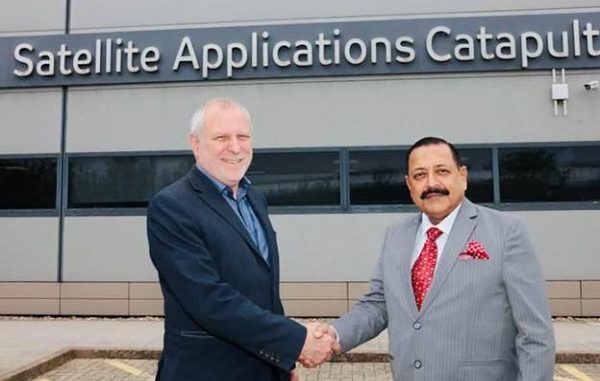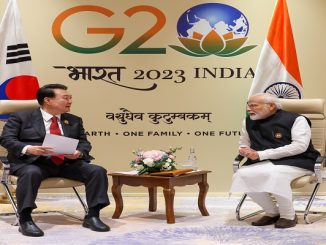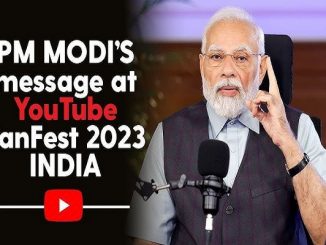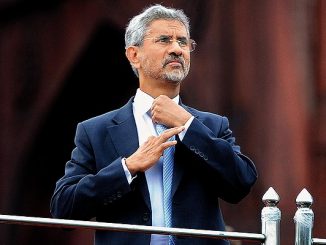
Apr 28: Union Minister of State (Independent Charge) Science & Technology; Minister of State (Independent Charge) Earth Sciences; MoS PMO, Personnel, Public Grievances, Pensions, Atomic Energy and Space, Dr Jitendra Singh today undertook a visit to the Satellite Applications Catapult at Oxford and witnessed a technical demonstration by Chief Technical Officer Paul Febvre at Harwell, Oxfordshire, United Kingdom.
The Satellite Applications Catapult is one of nine Catapults, uniquely established to transform the UK’s capability for innovation in specific areas and to help drive future economic growth. It is helping organisations make use of, and benefit from, satellite technologies, and bring together multi-disciplinary teams to generate ideas and solutions in an open innovation environment. The aim of the Catapult Centre is to support the UK industry by accelerating the growth of satellite applications and to contribute to capturing a 10% share of the global space market by 2030.
On his visit to the Catapult Centre, Dr Jitendra Singh described India as a key Global Player in the Space sector and reiterated that under Prime Minister Narendra Modi, India is keen to take its Space cooperation with the United Kingdom (UK) to newer heights. He further appreciated the work done by Satellite Applications Catapult and said that Indian Space Research Organization (ISRO), India’s premier space agency is looking forward to collaborating with the Catapult Centre and wider space sector of the United Kingdom.
Dr Jitendra Singh said that under Prime Minister Narendra Modi, the Space Sector in India is emerging as a major foreign exchange earner through the launch of many foreign satellites. He further stated that India has launched 385 foreign satellites so far, out of which 353 were launched in the last 8 years under this government, which is around 90% of all launches.
The Minister said that ISRO has gradually become one of the six largest space agencies in the world. India has one of the largest fleets of communication satellites (INSAT) and remote sensing (IRS) satellites. These satellites cater to the increasing demand for fast and reliable communication and earth observation respectively, he added.
In order to attract and nurture the young academia with innovative ideas/research aptitude for carrying out research and developing the Academia–Industry ecosystem for Space Technology, the Minister said that ISRO has set up a Space Technology Incubation Centre in 6 regions of the Country viz. Central, East, North, North-East, South and West. This will enable the young academia to realise their innovative ideas/research aptitude into space-grade components/elements which can be utilised for space applications and guide them towards setting-up the future start-ups.
On his visit, Dr Jitendra Singh also announced India-UK Space Parks partnerships. He urged the space parks in the UK to collaborate with Space parks in India.
Dr Jitendra Singh said, the list of achievements of India’s Space industries is quite long and informed that Indian Space Research Organization or ISRO had launched more than 100 satellites so far and has immense in-house satellite building capabilities for GSAT, Earth Observation Satellites and Space-based Satellite Navigation Systems. He proudly stated that India has also developed its own GPS, which we call the Indian Regional Navigation Satellite System or IRNSS. Besides the successful launch of India’s Mars orbiter mission in 2013, India has twice attempted to send its Mission to the moon known as Chandrayaan 1 and Chandrayaan 2. The third satellite mission to the moon, the Chandrayaan 3 will be launched next year, the Minister informed.
Dr Jitendra Singh said, India’s other flagship space programmes also include Human Space Flight Centre or what we call in India the Gaganyaan project under which we are planning to send our first crewed flight to space in 2024.
Dr Jitendra Singh said, the development of the Space sector is one of the priority areas for the leaders of both India and the UK and added that India started its space journey seven decades back from scratch and is today acknowledged to be a leading space power. He said the highlight of India’s journey has been its thrust on indigenous development through the dedication and hard work of its scientists guided by the leaders’ commitment.
The Minister said India is also keenly promoting the development of start-ups in the space sector to facilitate the entry of foreign government and private sector entities. In this regard, India has established a dedicated organisation called Indian Space Promotion and Authorisation Centre or IN-SPACe which is tasked with the objective of hand-holding our nascent private entities in the Space sector, he added.
Dr Jitendra Singh concluded by saying that it is time to take India-UK space cooperation to an entirely different and much higher spatial orbit. Lastly, as India assumed the chairmanship of G-20 on Dec 1, the Minister once again welcomed the UK to the G-20 Summit and G-20 meetings in the period of India’s chairmanship.
Dr Jitendra Singh is leading a high-level official Indian delegation of the Ministry of Science & Technology on a 6-day visit to the United Kingdom.
Disclaimer: We donot claim that the images used as part of the news published are always owned by us. From time to time, we use images sourced as part of news or any related images or representations. Kindly take a look at our image usage policy on how we select the image that are used as part of the news.


